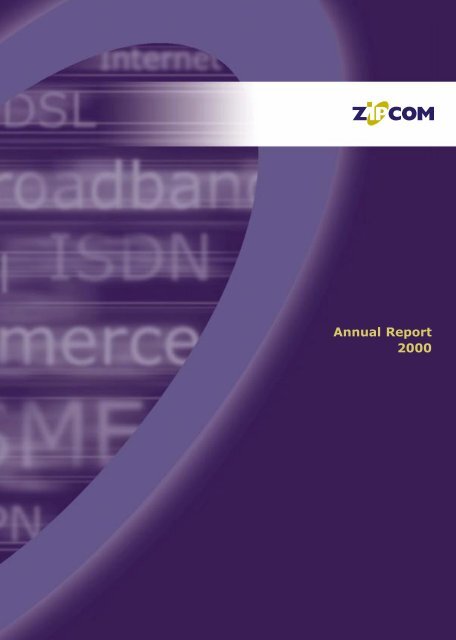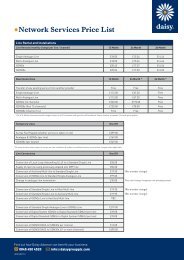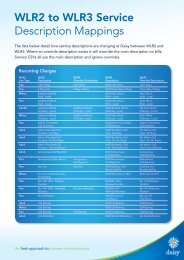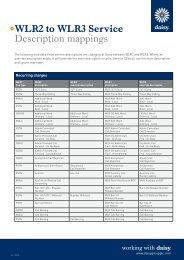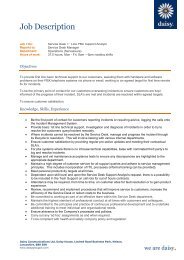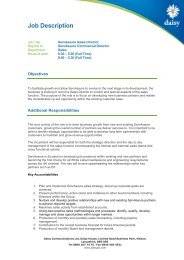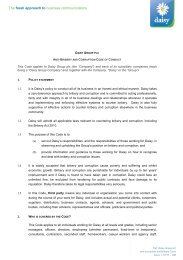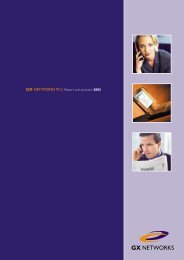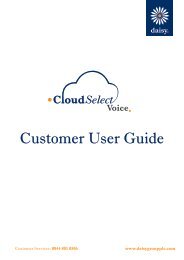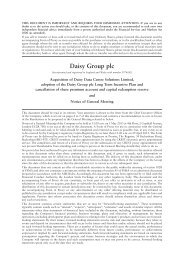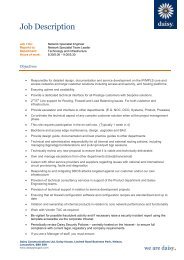Annual Report 2000 - Daisy Group PLC
Annual Report 2000 - Daisy Group PLC
Annual Report 2000 - Daisy Group PLC
Create successful ePaper yourself
Turn your PDF publications into a flip-book with our unique Google optimized e-Paper software.
<strong>Annual</strong> <strong>Report</strong><strong>2000</strong>
Zipcom plc<strong>Annual</strong> report <strong>2000</strong>ContentsChairman’s statement 2Operational and financial review 6Directors and advisers 8Board of Directors 10Senior management team 11Directors’ report 12Corporate governance 16Remuneration report 18Statement of Directors’ responsibilities 20Auditors’ report 21Consolidated profit and loss account 22Consolidated balance sheet 23Company balance sheet 24Consolidated cash flow statement 25Reconciliation of movements in shareholders’ funds 25Notes to the financial statements 26Notice of annual general meeting 36
Chairman’sstatement
Chairman’s statementOverviewIn what is our first report to shareholders, I am pleased to report on a year of considerable progress.The flotation in July <strong>2000</strong> provided the funds to put in place the operational capability to implement ourstrategy. We set out to build a successful, competitive local exchange carrier business (CLEC), with a strongsales and marketing led culture. As part of that strategy, we said in our admission document that it wouldbe our intention to outsource network design, build and commissioning; installation and maintenance; andour customer care and billing operations. I am pleased to report that all these critical functions have nowbeen outsourced on long term contracts.Our partnership with Scottish and Southern Energy has yielded the benefits expected and we have beenable to source our backbone infrastructure, tower sites and backhaul infrastructure from them as planned.In September, we finalised the switch selection process and awarded the contract to build and commissionour first main switch to Nortel Networks. This DMS switch was successfully handed over to us on8 December. The first two local loop systems were built in December and since then have undergone aprogramme of thorough and systematic testing. In total we invested £2.6m on our core switching,transmission and RFA networks during the year and, as at the end of December, we were awaiting the firstinterconnection with other carriers to bring this network fully into service.FundingIn July <strong>2000</strong> the Company raised £14m gross funds through an initial public offering of 73,684,211 ordinaryshares on the Alternative Investment Market. Dealing in the Company’s shares began on 4 July <strong>2000</strong>.Raising these funds allowed us to recruit our management team and begin to put the strategyinto operation.StrategyOur strategy is to position Zipcom as a new generation operator, offering leading edge services andsolutions to small and medium sized businesses in the less-competed second and third tier cities in the UK.We are now beginning to compete aggressively in the local access network to serve the widest possiblepotential customer base and to bring about a seamless integration of our fixed wireless access (FWA) andDSL technologies. This will allow us to ensure maximum usage of our core infrastructure assets.With our expertise in both FWA and DSL, Zipcom’s position as a local loop specialist operator in the Britishmarket is uniquely strong, which gives us operational flexibility and geographical reach denied to ourcompetitors. However, we are not a company that is defined by, or restricted to, particular accesstechnologies. Above all else, we depend on two things to deliver sustainable differential in the market:superior insight into customer requirements and intentions, and the ability and responsiveness to satisfythat demand.3
Chairman’s statementProductsAs with all other aspects of Zipcom’s strategy, our development of a portfolio of products and services isdriven by customers’ needs and a commitment to quality. Our target customer, the smaller enterprise, mayshow an increasing understanding of the future potential of e-business, but its urgent requirement is stillfor real competitive choice across a range of relatively basic services – such as voice telephony andInternet connectivity.Our first phase of product introductions specifically address that need, with the launch in Scotland of ZCall,our Voice Services product. ZCall offers a high quality telephone service at competitive rates, delivered viaa number of access methods – FWA, DSL and Indirect Access. ISDN, Internet services and a mobileoffering will all be launched shortly.Future product development will concentrate on more complex solutions, such as Virtual Private Networksand advanced application services. Many of these will be developed in co-operation with strategic partners,bringing specific technical, content or sector expertise.BrandingZipcom’s communications strategy is to build awareness and visibility on a region-by-region basis. This notonly allows a tightly targeted marketing investment to mirror the roll-out of coverage and service, it is alsoentirely consistent with the attitudes and interests of our customers in small and medium businesses,which tend to be local rather than national.Working in our launch region of Scotland, we have implemented a campaign which integrates print andradio advertising, direct marketing, public relations and executive briefings to achieve high levels ofexposure in target audiences. In the first phase, this has been concentrated around specific areas,including Perth, Inverness, Stirling and Dumfries. However, increasingly this geographical approach will becomplemented by programmes which address selected vertical sectors in the Scottish market – such asbusiness and professional services.A Glasgow-based advertising agency has been retained to help launch and develop the Zipcom brand. Wehave adopted a very distinctive visual style which combines strong images, bold colours – and a touch ofhumour – to establish the name and convey the message. The response from customers has been veryfavourable.Customers and marketsZipcom’s strategic focus is firmly on the Small and Medium Enterprise (SME) customer. The shape thatLocal Loop Unbundling has now taken in the UK suggests that this sector will not be well served by ourcompetitors’ plans for broadband deployment. Culturally and economically, larger operators in any casetend to feel more comfortable addressing the requirements of the corporate and major enterprise market.Zipcom, on the other hand, believes passionately that the IT-enabled smaller business can be a major forcein the networked economy of the near future. We have been built from the ground up as a company whichhas the knowledge, the technology and the commitment to serve that customer better than anyone else.We understand that we will have to address the SME on its own terms, shaping what we can do to deliverreal value to its business — improving productivity and profitability, and making it easier for it to acquireand service its customers.4
Chairman’s statementSales and marketingOur first direct mail campaign commenced in the launch cities of Perth and Inverness on 4 December <strong>2000</strong>.Our telemarketing partner followed up with an outbound calling campaign and the first appointments weremade for our sales force in the closing week of December, which resulted in some good initial results. I ampleased to report that momentum has continued to build satisfactorily since then.PeopleI am particularly proud that we have been able to recruit a very impressive and experienced managementteam. Our first phase of recruitment is now complete and future recruitment activity is now being confinedto sales positions only. Every employee will have share options in the Company, is well motivated and I amindebted to each one of them for their outstanding contribution to the development of the business overthe past six months.Future prospectsShareholders will be aware of our initial stated objective to return to the market for considerable additionalfunding to complete our main network roll-out. The current state of the debt and equity markets indicatethat this will not be possible in the timescale originally envisaged. At the year end we had a cash balanceof £10.1m and no borrowings. We remain convinced that the market opportunity for Zipcom isconsiderable, as demonstrated by the early take-up of our services. Our strategy of concentrating on highlytargeted markets in carefully selected geographic areas means that we are not subject to the samepressures of over-capacity experienced by the operators of major backbone networks. Nevertheless, in thecurrent environment the business continues to be managed on an extremely prudent basis with tightfinancial controls in place to preserve our cash as far into the future as possible. The speed at which weroll out to additional cities will, of course, depend on the appetite of the capital markets and of the majorequipment vendors for additional financing.Grahame PurvisChairman & Chief Executive5
Operationaland financialreview
Operational and financial reviewPerformanceDuring <strong>2000</strong>, the business evolved from a telecommunications licences owner into an operational Company.The Company has invested in the recruitment of a high calibre management team and funded the initiallaunch of services in the first of its target areas. Capital has also been invested in a core switching andRadio Fixed Access infrastructure.Operating losses of £3.0m in the year reflect the costs of bringing the business to operational readiness bythe year end. This result includes the pre-acquisition losses of RadioTel Systems Limited (RadioTel) whichhave been included under merger accounting rules. Prior year losses comprise the modest level of costsincurred in the very early stages of RadioTel’s development.The <strong>Group</strong> took on its first customers, for its ZCall service, towards the end of December <strong>2000</strong> forinstallation early in the new year. Consequently, there are no revenues reported in <strong>2000</strong>. The <strong>Group</strong>’s grossloss in the year is attributable to the payment of license fees and the cost of transmission capacity acquiredthrough various short term leases with other network operators.Capital structure and treasuryRadioTel raised £0.9m net from a private placement of shares in January <strong>2000</strong>. In June <strong>2000</strong>, the Companyacquired the entire share capital of RadioTel in a share for share exchange. Under merger accounting, thisinvestment is carried at cost in the Company balance sheet. This transaction was followed by a placing andadmission to the Alternative Investment Market, which raised £13.0m net of costs.At the end of December, the <strong>Group</strong> had cash balances of £10.1m and no borrowings. Surplus cash isinvested in money market instruments and earned interest in the year of £339,000. The <strong>Group</strong> hasexposure to exchange rate movements on its foreign currency denominated purchases, in particular theUS dollar, which it hedges through a mix of dollar options and forward contracts.The Company manages its cash resources very tightly, which is particularly important in the light of thecurrent depressed state of the capital markets. Outsource contracts have been placed with both billing andcustomer care providers using an application service provider model, enabling the <strong>Group</strong> to avoidsignificant capital expenditure.Capital expenditureThe <strong>Group</strong> invested £2.8m in capital programmes in the year, of which £2.6m was spent on its coreswitching and routing infrastructure and its RFA networks in Perth and Inverness. This investment is shownas assets under construction at the year end as the networks had not been brought into operational useat that time. The majority of equipment was purchased under various forms of deferred or conditionalpayment terms and the balance sheet shows accrued costs of future payment obligations amounting to£1.1m. Going forward, the majority of capital expenditure will be invested in providing services in the<strong>Group</strong>’s targeted local access areas and will therefore be customer driven.Stewart PorterChief Financial Officer7
Directorsand advisers
Directors and advisersDirectorsGrahame PurvisChairman and Chief ExecutiveStewart PorterChief Financial Officer and Company SecretaryColin McKeeTechnical DirectorPaul MaherNon Executive DirectorJon RichardsNon Executive DirectorRegistered office20 Black Friars LaneLondon EC4V 6HDRegistered number3948409AuditorsKPMG Audit plc8 Salisbury SquareLondon EC4Y 8BBStockbrokersCollins Stewart Limited21 New StreetBishopsgateLondon EC2M 4HRSolicitorsRowe and Maw20 Black Friars LaneLondon EC4V 6HDRegistrarCapita IRG plcBourne House34 Beckenham RoadBeckenhamKent BR3 4TUBankersHSBC Bank plc26 Broad StreetReadingBerkshire RG1 2BU9
Board of DirectorsGrahame PurvisChairman & Chief ExecutiveGrahame Purvis, an economics graduate, started his career in the oil industry as a marketing executivewith BP. Grahame has 14 years’ experience in the high technology and telecommunications sector. He hasheld senior board appointments in Blick plc, Cable and Wireless plc and Mercury Communications.At Mercury he was responsible for the initial commercial service launch and subsequently, as the firstgeneral manager, for generating the early rapid growth in revenue and profits. He was appointed to themanagement board in 1990 and the group executive committee in 1992. He is experienced in high techstart-up businesses from his three-year spell as Managing Director of Mercury Enterprises, where he wasresponsible for managing and developing the group’s portfolio of value-added businesses. During this timehe was also Chairman of Mercury’s mobile businesses. Prior to joining Zipcom, Grahame was a main boardDirector of Blick plc and Managing Director of its main UK business for 2 1 /2 years. Grahame has also heldnon executive Director appointments at LSI plc.Stewart PorterChief Financial OfficerStewart Porter is a Chartered Accountant and holds a Bachelor of Science degree in electrical engineering.Prior to joining Zipcom as Chief Financial Officer, Stewart was Finance Director for HighpointTelecommunications Inc, a Canadian listed company, where he was closely involved in the successfulestablishment of a number of European start-ups. Stewart worked for Cable and Wireless for 8 years in anumber of senior financial positions, most recently as Director of Finance and Business Development inGlobal Markets, the business unit responsible for serving the multinational customers of Cable and Wireless.Colin McKeeTechnical DirectorColin McKee holds a Bachelor of Science degree in mechanical and electronic engineering. In his 20 yearsof experience in telecommunications, Colin has been involved in the planning, implementation, projectmanagement and operation of major telecommunications networks and the development of long termnetwork strategy. His career in BT culminated as implementation project manager for police networksthroughout the UK and he has considerable radio expertise, demonstrated by his appointment as overallproject leader of the standardisation work for the TETRA radio system at the European TelecommunicationsStandards Institute.10
Board of Directors and senior management teamJon RichardsNon Executive DirectorJon Richards was Chief Executive of Anite <strong>Group</strong> plc from 1989 to 1997. Previously hewas Chief Operating Officer of the technology group UEI plc and Managing Director ofMiles 33 plc, a vertical market software business. Between 1992 and 1995 he alsoserved as non executive Chairman of the National Council for Educational Technology,a position to which he was appointed by the Secretary of State for Education, reportingto the Minister of State.Paul MaherNon Executive DirectorPaul Maher is Head of the Corporate <strong>Group</strong> at Rowe & Maw, one of London’s leadingcommercial law firms. Prior to joining Rowe & Maw in 1990, he was ICI’s in houselawyer for six years. Paul was recognised by Chambers in his nomination for theprestigious Business Lawyer of the Year <strong>2000</strong> Award and is ranked by Chambers as oneof the leading individuals in Corporate Finance. Paul advises on mergers, acquisitions,flotations, MBOs and joint ventures for a wide range of companies.Senior management teamRoy Walker<strong>Group</strong> Commercial DirectorStephen Sadler<strong>Group</strong> FinancialControllerJeremy Mooney<strong>Group</strong> Marketing DirectorDavid Roughley<strong>Group</strong> OperationsDirector11
Directors’report
Directors’ reportThe Directors present their annual report and the audited financial statements for the year ended31 December <strong>2000</strong>.Principal activity and business reviewThe principal activity of the <strong>Group</strong> during the period was the supply of telecommunications services.A detailed review of the business is set out in the Chairman’s statement on page 2 and the Operationaland financial review on page 6.Financial results and dividendsZipcom plc (the Company) was incorporated on 17 April <strong>2000</strong>. Its activities began on 26 June <strong>2000</strong>, onwhich date it acquired 100% of the shares of RadioTel Systems Ltd. The Company completed an initialpublic offering and joined the Alternative Investment Market on 4 July <strong>2000</strong>, raising £13.0m (net) throughthe issue of 73,684,211 ordinary 1p shares.As detailed in note 1 to the financial statements, merger accounting has been used to consolidate the<strong>Group</strong> results. The results for the <strong>Group</strong> for the year are shown in the Profit and Loss Account on page 22.The Directors do not recommend the payment of a dividend.Directors and Directors’ interestsThe Directors who held office during the year were as follows:Grahame PurvisChairman and Chief Executive (appointed 25 June <strong>2000</strong>)Stewart PorterChief Financial Officer (appointed 25 June <strong>2000</strong>)Colin McKeeTechnical Director (appointed 25 June <strong>2000</strong>)Peter NelsonNon Executive (appointed 25 June <strong>2000</strong>)Paul MaherNon Executive (appointed 21 November <strong>2000</strong>)G Purvis, S Porter, C McKee and P Maher, all having been appointed during the year, retire in accordancewith the articles of association and, being eligible, offer themselves for re-election.On 15 March 2001 P Nelson resigned and J Richards was appointed as a Director.The Directors’ remuneration and the interests of the Directors in the share capital of the Company aredetailed in the Remuneration report on page 18.13
Directors’ reportEmployeesIt is the policy of the <strong>Group</strong> that there should be no unfair discrimination in recruiting and promoting staff,including applicants who are disabled. The Directors are committed to maintaining and developingcommunication and consultation processes with employees, who in turn are encouraged to develop anawareness of the issues affecting the <strong>Group</strong>. The Directors place considerable emphasis on employeessharing in the success of the <strong>Group</strong>. This is achieved through the performance related bonus scheme andparticipation in the share option schemes.Substantial shareholdingsAs of 15 March 2001, the Directors were aware of the following significant shareholdings:%C McKee 19.7Granger Associates Limited 16.2Friends Ivory and Sime 8.7Fidelity Investment Services 7.8Jupiter Asset Management 6.2Collins Stewart 5.5G Purvis 3.9P Nelson 3.9Gartmore Investment Management 3.3The mid market price for the Company’s shares at 31 December <strong>2000</strong> was 19.5p. The high and lowmid market prices of the ordinary shares during the period from admission to AIM on 4 July <strong>2000</strong> to31 December <strong>2000</strong> were 22.5p and 19.5p respectively.Policy on payment to suppliersWhere the supply of goods and services is satisfactory and in the absence of any dispute, the <strong>Group</strong>’s andCompany’s policy is to pay suppliers in accordance with the terms agreed prior to the supply of goods andservices. Where no such agreement exists the <strong>Group</strong>’s and Company’s policy is to pay suppliers inaccordance with the terms contained in the invoice. Trade creditors of the <strong>Group</strong> at 31 December <strong>2000</strong> asa proportion of amounts invoiced by suppliers during the year represent 46 days. The Company has nomaterial trade creditors.14
Directors’ report<strong>Annual</strong> General MeetingThe <strong>Annual</strong> General Meeting will be held on 23 May 2001 at 21 New Street, Bishopsgate,London EC2M 4HR at 11 am.AuditorsIn accordance with section 385 of the Companies Act 1985, a resolution proposing that KPMG Audit plc bere-appointed as auditors of the <strong>Group</strong> will be put to the <strong>Annual</strong> General Meeting.This report was approved by the Board on 26 March 2001.Stewart PorterSecretary15
Corporate governanceCorporate governanceAlthough the Company is not required to comply with the provisions of the Combined Code, the Directorshave decided to provide the following voluntary corporate governance disclosures. The Board of Directorsrecognises the importance of, and is committed to, ensuring that effective corporate governanceprocedures are in place.This statement considers how the principles of the Combined Code on Corporate Governance (the Code)have been applied by the Company from its admission to the Alternative Investment Market on 4 July <strong>2000</strong>until 31 December <strong>2000</strong>.The Board and CommitteesDuring the period under review the Board comprised three executive Directors (G Purvis, S Porter andC McKee) and two non executive Directors (P Nelson and P Maher). Until the appointment of P Maher on21 November <strong>2000</strong> there was only one non executive Director. On 15 March 2001 P Nelson resigned andJ Richards was appointed to the Board. P Maher and J Richards are independent non executive Directors.The Board, which meets at least five times a year, is responsible for the overall strategy and financialperformance of the <strong>Group</strong> and has a formal schedule of matters reserved for its approval. Each Boardmeeting is preceded by a clear agenda and any relevant information is provided to Directors in advance ofthe meeting. All Directors are aware of their right to seek independent advice or to consult the CompanySecretary as required.The Board is chaired by Grahame Purvis who also acts as the Company’s Chief Executive. Due to the sizeof the business the Company has not segregated these two roles and the Board believes that the presenceof strong and independent non executive Directors makes this position appropriate at this time.The Board has established a Remuneration Committee which, throughout the period under review,consisted of G Purvis, P Nelson and, from 21 November <strong>2000</strong>, P Maher. Following the resignation ofP Nelson in March, J Richards was appointed to the Committee. The Remuneration report on pages 18 to19 contains a detailed description of remuneration and applicable policies.Given the small size of the Board, and as permitted by the Code, the Board has not appointed aNominations Committee. The Board as a whole considers the appointment of all Directors and seniormanagers.The Audit Committee was formed on 15 March 2001 and comprises G Purvis, J Richards and P Maher.The Committee operates under written terms of reference and is scheduled to meet at least twice a yearwith the Company’s auditors present.16
Corporate governanceRelations with shareholdersThe Company encourages the participation of both institutional and private investors. Communication withprivate individuals is maintained through the annual general meeting (AGM), and annual and interimreports. In addition, further details on the strategy and performance of the Company can be found at itswebsite (www.zipcom.uk.com) which includes copies of the Company’s press releases.The Chairman will be available to answer questions at the AGM. Details of the resolutions to be proposedat the AGM are set out in the separate notice sent to all shareholders.Internal controlThe Board has overall responsibility for the <strong>Group</strong>’s systems of internal control and for monitoring theireffectiveness. Although no system of internal control can provide absolute assurance against material misstatementor loss, the <strong>Group</strong>’s systems are designed to provide the Directors with reasonable assurancethat issues are identified on a timely basis and dealt with appropriately.The <strong>Group</strong> has an established organisational structure with clearly defined lines of authority, responsibilityand accountability which is reviewed regularly. <strong>Group</strong> management is responsible for the identification andevaluation of key risks applicable to their areas of business. These risks are assessed on a regular basisand may be associated with a variety of internal or external sources including control breakdowns,disruption in information systems, competition, human resource issues and regulatory requirements.The external auditors are engaged to express an opinion on the accounts. They review and test thesystems of internal financial controls and data contained in the accounts to the extent necessary to expresstheir audit opinion. They discuss with management the reporting of operational results and the financialcondition of the <strong>Group</strong>. The Board has reviewed the need for an internal audit function. The Directorsconsider that, given the size of the <strong>Group</strong>’s operations, it is inappropriate to establish an internal auditfunction at this time.Going concernThe <strong>Group</strong> has financed its trading losses for the year from cash raised from the initial public offering (IPO)in July <strong>2000</strong>. The IPO raised £13.0m (net) cash and the <strong>Group</strong> had cash of £10.1m at 31 December <strong>2000</strong>.At the time of the IPO the Directors anticipated returning to the market for second round funding during2001. Given the subsequent deterioration in the capital markets the Directors continue to monitor the<strong>Group</strong>’s funding strategy. As a result revised forecasts have been prepared which show a lower fundingrequirement than envisaged at the time of the IPO, and these revised forecasts therefore underpin thegoing concern basis which the Directors have applied in the preparation of the financial statements for theyear ended 31 December <strong>2000</strong>.17
Remuneration reportRemuneration reportRemuneration CommitteeThroughout the year the Remuneration Committee consisted of G Purvis, P Nelson and, from 21 November<strong>2000</strong>, P Maher. Following the resignation of P Nelson in March 2001, J Richards was appointed to theCommittee.The Committee meets not less than twice a year to determine all aspects of the remuneration of theexecutive Directors and other senior managers. The fees of the non executive Directors are determined bythe Board as a whole. No Director or employee has a role in determining his own remuneration.Remuneration policyThe Committee determines overall policy for executive remuneration. The Committee sets levels ofremuneration to attract and retain executive Directors and other senior managers and, in doing so, takesinto account the level of remuneration throughout the telecommunications industry. Employees throughoutthe <strong>Group</strong>, including executive Directors, have performance reviews annually. The main components of theexecutive Directors’ and senior managers’ remuneration are:●a competitive base salary●an annual performance bonus●pension provision●benefits in kind●share optionsThe <strong>Group</strong> operates a discretionary bonus scheme based on the <strong>Group</strong>’s and the individual’s performance.Payments may be made annually.The <strong>Group</strong> makes contributions to money purchase personal pension schemes on behalf of all executiveDirectors and senior managers.Other customary benefits, such as car allowances, permanent health insurance and life assurance are madeavailable as appropriate.The <strong>Group</strong> has two share options schemes, the Unapproved Executive Share Option Scheme and theApproved Executive Share Option Scheme. Details of options granted under these schemes are given innote 14 to the financial statements.18
Remuneration reportSet out below are the total remuneration, shareholdings and option interests of the Directors for the year:Directors’ remunerationNote Salaries Benefits Bonus Total Total Pension Pension& Fees <strong>2000</strong> 1999 <strong>2000</strong> 1999£’000 £’000 £’000 £’000 £’000 £’000 £’000ExecutiveG Purvis 124 10 50 184 13 11 -S Porter 118 5 50 173 - 11 -C McKee 122 5 50 177 25 9 -Non executiveP Nelson (i) 95 1 - 96 25 5 -P Maher (ii) 3 - - 3 - - -462 21 150 633 63 36 -(i) Payments to P Nelson include amounts paid to him in his capacity as an executive Director of RadioTel Systems Limited.(ii) P Maher became a non executive Director on 21 November <strong>2000</strong>.Directors’ shareholdings1p ordinary shares1p ordinary sharesat 31 December <strong>2000</strong> at 31 December 1999G Purvis 6,001,000 -S Porter - -C McKee 30,005,000 -P Nelson 6,001,000 -P Maher - -Directors’ share optionsNote Number of Awarded/ Number of Exerciseoptions at (exercised) options at price01.01.00 during year(v) 31.12.00 (i)G Purvis (ii) - 5,047,138 5,047,138 1p- 2,602,440 2,602,443 8p- 750,000 750,000 (iv)S Porter (ii) - 3,682,713 3,682,712 1p- 2,602,440 2,602,443 8p- 750,000 750,000 (iv)C McKee - 750,000 750,000 (iv)P Nelson - - - -P Maher - - - -(i)(ii)(iii)(iv)(v)All the awards above represent rights to options which the Company is contracted to grant. The options had not been grantedat 31 December <strong>2000</strong>. All the above options will be granted under the Unapproved Executive Share Option Scheme.These awards replace options held in RadioTel Systems Limited which were granted in December 1999. These options wereconverted to rights to options over Zipcom plc ordinary shares during the year.All the above awards were made at fair value at the date of the award.Options to be granted at the fair market value at the time of grant.No Directors exercised options during the year.19
Statement of Directors’ responsibilitiesStatement of Directors’ responsibilitiesCompany law requires the Directors to prepare financial statements for each financial year which give atrue and fair view of the state of affairs of the Company and <strong>Group</strong> and of the profit or loss for that period.In preparing those financial statements, the Directors are required to:●select suitable accounting policies and then apply them consistently;●make judgements and estimates that are reasonable and prudent;●state whether applicable accounting standards have been followed, subject to any material departuresdisclosed and explained in the financial statements;●prepare the financial statements on the going concern basis unless it is inappropriate to presume thatthe <strong>Group</strong> will continue in business.The Directors are responsible for keeping proper accounting records which disclose with reasonableaccuracy at any time the financial position of the Company and enable them to ensure that the financialstatements comply with the Companies Act 1985. They have general responsibility for taking such stepsas are reasonably open to them to safeguard the assets of the <strong>Group</strong> and to prevent and detect fraud andother irregularities.20
Auditors’ report<strong>Report</strong> of the auditorsto the members of Zipcom plcWe have audited the financial statements on pages 22 to 35.Respective responsibilities of Directors and auditorsThe Directors are responsible for preparing the Directors’ report and, as described on page 20, the financialstatements in accordance with applicable United Kingdom law and accounting standards. Ourresponsibilities, as independent auditors, are established in the United Kingdom by statute, the AuditingPractices Board and by our profession’s ethical guidance.We report to you our opinion as to whether the financial statements give a true and fair view and areproperly prepared in accordance with the Companies Act. We also report to you if, in our opinion, theDirectors’ report is not consistent with the financial statements, if the Company has not kept properaccounting records, if we have not received all the information and explanations we require for our audit,or if information specified by law regarding Directors’ remuneration and transactions with the <strong>Group</strong> is notdisclosed.We read the other information accompanying the financial statements and consider whether it is consistentwith those statements. We consider the implications for our report if we become aware of any apparentmisstatements or material inconsistencies with the financial statements.Basis of opinionWe conducted our audit in accordance with Auditing Standards issued by the Auditing Practices Board.An audit includes examination, on a test basis, of evidence relevant to the amounts and disclosures in thefinancial statements. It also includes an assessment of the significant estimates and judgements made bythe Directors in the preparation of the financial statements, and of whether the accounting policies areappropriate to the <strong>Group</strong>’s circumstances, consistently applied and adequately disclosed.We planned and performed our audit so as to obtain all the information and explanations which weconsidered necessary in order to provide us with sufficient evidence to give reasonable assurance that thefinancial statements are free from material misstatement, whether caused by fraud or other irregularityor error. In forming our opinion we also evaluated the overall adequacy of the presentation of informationin the financial statements.OpinionIn our opinion the financial statements give a true and fair view of the state of affairs of the Company andthe <strong>Group</strong> as at 31 December <strong>2000</strong> and of the loss of the <strong>Group</strong> for the year then ended, and have beenproperly prepared in accordance with the Companies Act 1985.KPMG Audit plc26 March 2001Chartered AccountantsRegistered Auditor21
Consolidated profit and loss account for the year ended 31 December <strong>2000</strong>Continuing operationsNote <strong>2000</strong>) 1999)£’000) £’000)<strong>Group</strong> Turnover 2 –) –)Cost of sales (157) (7)Gross loss (157) (7)Operating expenses (2,802) (138)Operating loss 3 (2,959) (145)Net interest receivable 5 339) –)Loss on ordinary activities before taxation (2,620) (145)Tax on loss on ordinary activities 6 –) –)Loss for the financial year 15 (2,620) (145)Loss per Ordinary share – Basic 19 2.3p 0.2pLoss per Ordinary share – Diluted 19 2.1p 0.2pThere are no recognised gains or losses other than the loss for the financial year and accordingly no Statement of Total RecognisedGains and Losses has been produced.There is no difference between the <strong>Group</strong>’s historical cost loss and that reported in the profit and loss account above.The accompanying notes form an integral part of these financial statements.22
Consolidated balance sheet at 31 December <strong>2000</strong>Note <strong>2000</strong>) <strong>2000</strong>) 1999) 1999)£’000) £’000) £’000) £’000)Fixed assetsTangible assets 7 2,750) –)Current assetsDebtors 9 511) 10)Cash at bank and in hand 10,078) –)10,589) 10)Creditors: amounts falling due within one year 10 (2,021) (260)Net current assets/(liabilities) 8,568) (250)Total assets less current liabilities 11,318) (250)Provisions for liabilities and charges 12 (271) –)Net assets/(liabilities) 11,047) (250)Capital and reservesCalled up share capital 14, 15 1,523) –)Share premium account 15 12,187) –)Capital reserve 15 207) –)Profit and loss account 15 (2,870) (250)Equity shareholders’ funds/(deficit) 11,047) (250)These financial statements were approved by the Board of Directors on 26 March 2001 and were signed on its behalf by:Grahame PurvisChairman and Chief ExecutiveStewart PorterChief Financial OfficerThe accompanying notes form an integral part of these financial statements.23
Company balance sheet at 31 December <strong>2000</strong>Note <strong>2000</strong>) <strong>2000</strong>£’000) £’000Fixed assetsInvestments 8 740Current assetsDebtors 9 213)Cash at bank and in hand 10,056)10,269)Creditors: amounts falling due within one year 10 (3)Net current assets 10,266)Debtors due after more than one year 9 3,031)13,297Net assets 14,037Capital and reservesCalled up share capital 14, 15 1,523Share premium account 15 12,187Profit and loss account 15 327Equity shareholders’ funds 14,037These financial statements were approved by the Board of Directors on 26 March 2001 and were signed on its behalf by:Grahame PurvisChairman and Chief ExecutiveStewart PorterChief Financial OfficerThe accompanying notes form an integral part of these financial statements.24
Consolidated cash flow statement for the year ended 31 December <strong>2000</strong>Note <strong>2000</strong>) <strong>2000</strong>) 1999£’000) £’000) £’000Cash outflow from operating activities 16 (2,450) –Returns on investment and servicing of financeInterest received 126) –Capital expenditure and financial investment –Purchase of tangible fixed assets (1,515)Cash outflow before financing (3,839) –FinancingIssue of ordinary share capital 15,000)Expenses on issue of ordinary share capital (1,083)Net cash inflow from financing 13,917) –Increase in cash in the period 17 10,078) –Reconciliation of movements in shareholders’ funds for the year ended 31 December <strong>2000</strong><strong>Group</strong>)Company<strong>2000</strong>) 1999) <strong>2000</strong>£’000) £’000) £’000(Loss)/profit for the financial year (2,620) (145) 327New share capital subscribed (net of issue costs) 13,710) –) 13,710Movement on capital reserve 207) –) –)Net addition to/(reduction in) shareholders’ funds 11,297) (145) 14,037Opening shareholders’ funds (250) (105) –)Closing shareholders’ funds/(deficit) 11,047) (250) 14,037)The accompanying notes form an integral part of these financial statements.25
Notes to the financial statements1 Accounting policiesThe following accounting policies have been applied consistently in dealing with items which are consideredmaterial in relation to the <strong>Group</strong>’s financial statements.Basis of preparationThe financial statements have been prepared in accordance with applicable accounting standards and underthe historical cost convention.Going concernThe <strong>Group</strong> has financed its trading losses for the year from cash raised from the initial public offering (IPO)in July <strong>2000</strong>. The IPO raised £13.0m (net) cash and the <strong>Group</strong> had cash of £10.1m at 31 December <strong>2000</strong>.At the time of the IPO the Directors anticipated returning to the market for second round funding during2001. Given the subsequent deterioration in the capital markets the Directors continue to monitor the<strong>Group</strong>’s funding strategy. As a result revised forecasts have been prepared which show a lower fundingrequirement than envisaged at the time of the IPO and these revised forecasts therefore underpin the goingconcern basis which the Directors have applied in the preparation of the financial statements for the yearended 31 December <strong>2000</strong>.Basis of consolidationThe Company was incorporated on 17 April <strong>2000</strong>. Its activities began on 26 June <strong>2000</strong> on which date itacquired the entire issued share capital of RadioTel Systems Limited in a share for share exchange as partof a <strong>Group</strong> reorganisation. With effect from that date RadioTel Systems Limited became the Company’sprincipal operating subsidiary. On 23 August <strong>2000</strong> RadioTel Systems Limited changed its name to ZipcomTelecommunications Limited.The acquisition by the Company of RadioTel Systems Limited was accounted for in accordance with theprinciples of merger accounting, set out in Financial <strong>Report</strong>ing Standard 6 “Mergers and Acquisitions”.Accordingly, the comparative figures are presented as if the combination had existed throughout the yearended 31 December 1999.In the Company’s balance sheet, the investment in Zipcom Telecommunications Limited is stated at thenominal value of the shares issued in consideration for that company. As permitted by Sections 131 and133 of the Companies Act 1985, no premium has been recorded on the shares issued in consideration. Onconsolidation, the difference between the nominal value of the shares issued and received is crediteddirectly to the capital reserve.The <strong>Group</strong> financial statements consolidate the financial statements of Zipcom plc and all its subsidiaryundertakings.As permitted by Section 230 of the Companies Act 1985, a separate profit and loss account is not presentedin respect of the Company.TurnoverTurnover comprises the value of telecommunications services provided net of value added tax.26
Notes to the financial statementsTangible fixed assets and depreciationDepreciation is provided to write off the cost less the estimated residual value of tangible fixed assets byequal instalments over their estimated useful economic lives, as follows:Network infrastructureOffice equipmentLeasehold improvementsMotor vehicles3 to 10 years3 to 5 yearsLife of the lease4 yearsNo depreciation is charged on assets under construction. Where assets are financed under finance leasesthe cost is written off over the shorter of the lease term and the remaining useful economic life.Foreign currenciesTransactions in foreign currencies are recorded using the rate of exchange ruling at the date of thetransaction. Monetary assets and liabilities denominated in foreign currencies are translated using the rateof exchange ruling at the balance sheet date and the gains or losses on translation are included in theprofit and loss account.The assets and liabilities and profit and loss accounts of overseas subsidiary undertakings are translatedat the closing exchange rates. Profit and loss accounts of such undertakings are consolidated at theaverage rates of exchange during the year. Gains and losses arising on these translations are taken toreserves, net of exchange differences arising on related foreign currency borrowings.LeasesAssets acquired under finance leases are capitalised and the outstanding future lease obligations areshown in creditors. Operating lease rentals are charged to the profit and loss account on a straight linebasis over the period of the lease.Pension costsThe pension costs charged against profit represent the amounts of contributions payable to the <strong>Group</strong>pension scheme in the accounting period.Share optionsThe cost of awards to employees that take the form of shares or rights to shares are recognised over theperiod of the employee’s related performance.TaxationThe charge for taxation is based on the results for the period and takes into account taxation deferredbecause of timing differences between the treatment of certain items for taxation and accountingpurposes. Provision is made for deferred tax only to the extent that it is probable that an actual liabilitywill crystallise.27
Notes to the financial statements2 Segmental informationThe <strong>Group</strong> had a single class of business during all periods reported on.The net assets of the <strong>Group</strong> at the end of each period were all attributable to the United Kingdom.The loss before tax of the <strong>Group</strong> during each period was attributable to the United Kingdom.3 Operating lossOperating loss is stated after charging: <strong>2000</strong> 1999£’000 £’000Auditors’ remuneration:– audit 25 1– other services 7 –Depreciation and other amounts written off tangible fixed assets:Owned 15 –Rentals payable under operating leases:Motor vehicles 2 –In addition to the amounts disclosed above for audit services KPMG Audit plc raised fees of £169,000relating to the initial public offering. These fees have been written off against the share premium account.4 Staff numbers and costsThe average number of persons (including executive Directors) employed by the <strong>Group</strong> during each periodwas as follows:<strong>2000</strong> 1999£’000 £’000Full time operations staff 6 1Operations staff employed under short-term contracts 1 –The aggregate payroll costs (including Directors’ remuneration) were as follows:<strong>2000</strong> 1999£’000 £’000Wages and salaries 865 62Social security costs 372 –Pension costs 48 –1,285 62Details of Directors’ remuneration are set out in the Remuneration report on page 18.Included in social security costs is a provision of £271,000 for National Insurance payable on the exercise of28share options, in accordance with the provisions of Urgent Issues Task Force Abstract (UITF) 25 (note 12).
Notes to the financial statements5 Interest receivable<strong>2000</strong> 1999£’000 £’000Bank interest receivable 339 –6 TaxationThere is no charge to corporation tax due to the losses incurred in each period. At 31 December <strong>2000</strong>there are unrelieved losses in the <strong>Group</strong> of approximately £2,100,000.The above figure is subject to the agreement of corporation tax computations with the relevant taxauthorities.7 Tangible fixed assetsAssets under Leasehold Network Office Motor Totalconstruction improvements infrastructure equipment vehicles£’000 £’000 £’000 £’000 £’000 £’000<strong>Group</strong>CostAt 1 January <strong>2000</strong> – – – – – –Additions 2,528 95 48 31 63 2,765At 31 December <strong>2000</strong> 2,528 95 48 31 63 2,765DepreciationAt 1 January <strong>2000</strong> – – – – – –Charge for year – 1 7 2 5 15At 31 December <strong>2000</strong> – 1 7 2 5 15Net book valueAt 31 December <strong>2000</strong> 2,528 94 41 29 58 2,750At 31 December 1999 – – – – – –Assets under construction represent network infrastructure assets which had not been brought into useby 31 December <strong>2000</strong>. Accordingly no depreciation has been charged on these assets in the year.The Company held no tangible fixed assets as at 31 December <strong>2000</strong>.29
Notes to the financial statements8 Fixed asset investmentsShares in <strong>Group</strong>undertaking£’000CompanyCost1 January <strong>2000</strong> –Additions 740At 31 December <strong>2000</strong> 740The <strong>Group</strong> includes the following wholly owned subsidiary undertaking:Name Class of share Proportion Nature of businesscapital heldheldZipcom Telecommunications Limited Ordinary shares 100% Telecommunications9 Debtors<strong>Group</strong> <strong>Group</strong> Company<strong>2000</strong> 1999 <strong>2000</strong>£’000 £’000 £’000Other debtors 266 10 –Prepayments and accrued income 245 – 213511 10 213Debtors due after more than one yearAmounts owed by <strong>Group</strong> undertakings – – 3,03130
Notes to the financial statements10 Creditors: amounts falling due within one year<strong>Group</strong> <strong>Group</strong> Company<strong>2000</strong> 1999 <strong>2000</strong>£’000 £’000 £’000Amounts owed to related parties (note 18) – 96 –Trade creditors 450 106 3Taxation and social security 74 31 –Other creditors 8 25 –Accruals and deferred income 1,489 2 –2,021 260 311 Operating leasesThe <strong>Group</strong> had commitments to make annual payments under non-cancellable operating leases whichexpire as follows:ShortShortleaseholdleaseholdproperty Other property Other<strong>2000</strong> <strong>2000</strong> 1999 1999£’000 £’000 £’000 £’000Within one year – – – –Within two to five years 80 7 – –After five years 45 – – –125 7 – –12 Provisions for liabilities and chargesTotal£’000<strong>Group</strong>At 1 January <strong>2000</strong> –Charge for National Insurance on option gains 271At 31 December <strong>2000</strong> 271The provision is made according to UITF 25 and relates to the National Insurance payable on exercise ofshare options.31
Notes to the financial statements13 Financial instrumentsThe <strong>Group</strong>’s financial instruments comprise cash and liquid resources, and various items such as tradedebtors and trade creditors that arise directly from its operations. The main purpose of the financialinstruments is to provide finance for the <strong>Group</strong>’s operations.It is the <strong>Group</strong>’s policy that no speculative trading in financial instruments shall be undertaken.The main risks arising from the <strong>Group</strong>’s financial instruments are interest rate risk, liquidity risk and foreigncurrency risk. The Directors review and agree policies for managing each of these risks.As permitted by Financial <strong>Report</strong>ing Standard (FRS) 13, short term debtors and creditors have beenexcluded from all following disclosures.(i) Interest rate riskThe <strong>Group</strong> financed its operations throughout the year from bank deposits. The <strong>Group</strong> does not considerthat its current exposure to movements in interest rates is sufficient to necessitate hedging. The interestrate exposure of the financial assets of the <strong>Group</strong> as at 31 December was:Fixed Floating Nil Total£’000 £’000 £’000 £’000<strong>2000</strong> : Sterling financial assets 10,011 55 12 10,0781999 – – – –(ii) Liquidity riskThe <strong>Group</strong>’s objective is to ensure adequate funding for its operations ahead of commitments being madefor expansion. This has been achieved in the current year through the issue of equity.(iii) Foreign currency riskThe <strong>Group</strong> has some transactional currency exposures. Such exposures mainly arise from purchases indollars. The <strong>Group</strong> hedges this risk through the use of dollar options and forward contracts. The value ofdollar options is assessed using the year end rate and to the extent that the value is below the exercisevalue any premium is written off to the profit and loss account. Gains or losses on forward contracts arerecognised on maturity of the underlying transaction.At 31 December the <strong>Group</strong> had outstanding forward contracts to hedge dollar purchases as below:In currencySterling equivalent<strong>2000</strong> 1999 <strong>2000</strong> 1999US$’000 US$’000 £’000 £’000Maturing within one year:- to cover futurecapital commitments 580 – 388 –32
Notes to the financial statementsThe following table sets out the <strong>Group</strong>’s exposure to monetary liabilities held in non-functional currenciesat 31 December <strong>2000</strong>:<strong>2000</strong> 1999£’000 £’000US Dollar liabilities 101 -Other than the forward contracts disclosed above there is no difference between the book and fair valuesof the <strong>Group</strong>’s financial assets and liabilities.14 Called up share capitalAuthorised and allotted share capital<strong>2000</strong> 1999£’000 £’000AuthorisedEquity: ordinary shares of 1p each 2,000 –Allotted, called up and fully paidEquity: ordinary shares of 1p each 1,523 –On 26 June <strong>2000</strong> Zipcom plc issued 74,012,133 ordinary shares to acquire RadioTel Systems Limited.On 4 July <strong>2000</strong> the Company was admitted to the Alternative Investment Market, issuing 73,684,211ordinary shares. On the same day the Company issued 4,567,928 shares to Collins Stewart Limited.Share optionsAt 31 December <strong>2000</strong> rights to options over 16,184,736 ordinary shares of the Company were outstandingas follows:Unapproved Executive Share Option SchemeRights to sharesunder optionExerciseprice8,729,851 1p5,204,880 8p2,250,000 (i)(i) To be granted at the fair market value at the time of grant.All the awards above represent rights to options which the Company is contracted to grant. The optionshad not been granted at 31 December <strong>2000</strong>. All the above options will be granted under the UnapprovedExecutive Share Option Scheme.The options become exercisable at the date of grant and expire ten years from that date.At 31 December <strong>2000</strong> there were a further 18,023,565 shares available for grant under options.33
Notes to the financial statements15 Reconciliation of movements in shareholders’ fundsShare Share) Capital Profit) Total)capital premium) reserve and loss)account)account)£’000 £’000) £’000 £’000) £’000)<strong>Group</strong>At 1 January <strong>2000</strong> – –) – (250) (250)Issue of shares 1,523 13,217) – –) 14,740)Issue costs – (1,030) – –) (1,030)Retained loss for the year – –) – (2,620) (2,620)Movement on capital reserve * – –) 207 –) 207)At 31 December <strong>2000</strong> 1,523 12,187) 207 (2,870) 11,047)CompanyAt 1 January <strong>2000</strong> – –) – –) –)Issue of shares 1,523 13,217) – –) 14,740)Issue costs – (1,030) – –) (1,030)Retained profit for the year – –) – 327) 327)At 31 December <strong>2000</strong> 1,523 12,187) – 327) 14,037)* The movement on the capital reserve represents the difference between the nominal value ofZipcom plc shares issued and the nominal value of RadioTel Systems Limited shares acquired followingthe acquisition of RadioTel Systems Limited by Zipcom plc.16 Reconciliation of operating loss to operating cash flows<strong>2000</strong>) 1999)Total) Total)£’000) £’000)Operating loss (2,959) (145)Depreciation 15) –)Increase in debtors (288) (5)Increase in creditors 511) 150)Non cash charge in respect of provisions 271) –)Net cash outflow from operating activities (2,450) –)34
Notes to the financial statements17 Analysis of net funds1 January Cash flow 31 December<strong>2000</strong> <strong>2000</strong>£’000 £’000 £’000Cash at bank and in hand – 10,078 10,07818 Related party disclosuresAs disclosed on page 14 Granger Associates Limited was a shareholder of the Company at 31 December<strong>2000</strong>. The Company understands that Granger Associates Limited has certain shareholders in commonwith Granger Telecom Limited, with whom the <strong>Group</strong> has a contract to purchase radio fixed accessequipment. Purchases made by the <strong>Group</strong> during the year amounted to £1,515,000. As at 31 December<strong>2000</strong> amounts invoiced by Granger Telecom Limited but not paid were £101,000.Paul Maher was appointed to the Company Board on 21 November <strong>2000</strong>. Mr Maher is a partner inRowe and Maw, the <strong>Group</strong>’s solicitor, who advised throughout the year including on the initial publicoffering. Since Mr Maher’s appointment Rowe and Maw have provided services to the <strong>Group</strong> to the valueof £11,000 of which £nil was payable at 31 December <strong>2000</strong>.19 Loss per shareYear endedYear endedDecember 31 December 31<strong>2000</strong> 1999 (restated)Loss for the financial periodattributable to shareholders £2,620,000 £145,000Weighted average numberof equity shares in issue 113,892,797 62,128,872Dilution effects of share options 8,507,335 –Diluted weighted averagenumber of equity shares 122,400,132 62,128,872Basic loss per equity share 2.3p 0.2pDiluted loss per equity share 2.1p 0.2pThe dilutive effect of share options which the Company has a contractual obligation to grant have beenincluded in arriving at the calculation of diluted loss per equity share.35
Notice of <strong>Annual</strong> General MeetingZipcom plcNotice is here by given that the annual general meeting of the Company will be held at 21 New Street,Bishopsgate, London, EC2M 4HR on 23 May 2001 at 11.00 am. for the transaction of the followingbusiness:To consider and, if thought fit, pass the following resolutions which will be proposed as ordinary resolutions:1. To receive the Directors’ report and the audited accounts for the period ended 31 December 2001 andto note that the Directors do not recommend the payment of any final dividend for that period2. To re-elect Mr Paul Joseph Maher as a Director3. To re-elect Mr Colin Mckee as a Director4. To re-elect Mr Stewart Charles Porter as a Director5. To re-elect Mr Grahame Robert Purvis as a Director6. To re-elect Mr Jon Richards as a Director7. To re-appoint Messrs KPMG Audit plc as auditors and authorise the Directors to determinetheir remuneration.By order of the BoardS C PorterDirector and SecretaryDated 30 April 200120 Black Friars LaneLondon EC4V 6HDNotes(a)Any member of the Company entitled to attend and vote at the meeting may appoint one or moreproxies to attend and, on a poll, to vote on his/her behalf. A proxy need not be a member. Forms ofproxy should be lodged with the Company’s Registrars, IRG plc, Balfour House, 390/398 High Road,Ilford, Essex IG1 1NQ not later than 48 hours before the time for which the meeting is convened.Completion of the appropriate form of proxy does not prevent a member from attending and votingin person if he/she is entitled to do so and so wishes.(b)Members are informed that a register of all interests of each Director and his family in each class ofshare capital of the Company and its subsidiaries and copies of all contracts of service of more thanone year’s duration of any Director with the Company or any of its subsidiaries are available forinspection at the Registered Office of the Company during normal business hours on any weekday(Saturdays and public holidays excepted) from the date of this notice until the close of the meetingand, on the day of the meeting, at the place of the meeting from at least 15 minutes prior to themeeting until its conclusion.36
Zipcom plcRed HouseBrookwoodSurreyGU24 0BLTel: 01483 522 900Fax: 01483 522 925E-mail: info@zipcom.uk.comwww.zipcom.uk.com


